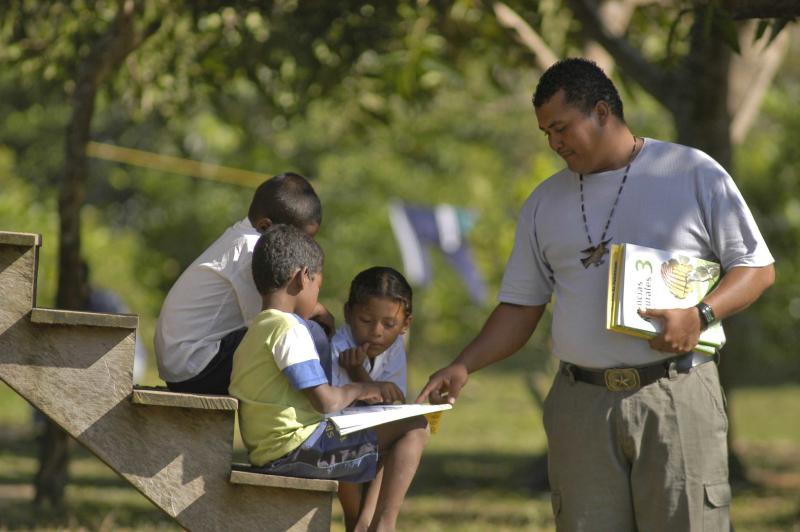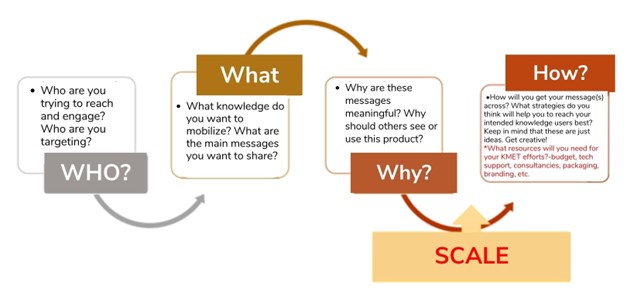
Knowledge mobilization is not only the responsibility of researchers. It is a collective effort involving different actors including institutions, organizations, policy makers and, particularly in the context of our research project, community members. Community-level knowledge mobilization was key to some of the biggest impacts our project has seen, including participation in national-level discussions in Ghana on literacy and child learning. Different actors working together and effectively sharing knowledge at the community level has facilitated knowledge mobilization at the national level, allowing us to increase the reach and impact of our research.
The Improving Literacy of Children through Support from Community Networks project is part of the applied research portfolio of the Global Partnership for Education (GPE) Knowledge and Innovation Exchange (KIX), a joint endeavour with Canada’s International Development Research Centre (IDRC). This project tests how the Unlock Literacy (UL) model[EG1] allows for a holistic approach to core literacy skills for vulnerable early grade students in Honduras, Nicaragua and Ghana. It is supported by a consortium of practitioners and academic partners. As a group of researchers and practitioners working in the field of applied research, one of our key goals is to ensure that our findings and recommendations have a meaningful impact beyond academia and are used to influence policy and practice to scale the community-based literacy intervention to new communities and countries.
Moving Knowledge into Action
Knowledge mobilisation (KMb) processes in applied research can be challenging, even more so when the project is operating across three countries with different contextual factors that influence the way knowledge is created, accessed, shared, and used. To address this, we conducted a robust stakeholder mapping process to reflect on how, across the countries, the KMb process can leverage, strengthen and build relationships with key stakeholders. Conducting this process was essential to help the team customize efforts and tools used to disseminate findings aligned with and responsive to the diverse needs and priorities of the targeted users of our research. A set of questions, which were adopted, customized and adapted from Ontario Centre of Excellence for Child and Youth Mental Health KM toolkit, guided the process as outlined in Picture 1 below.

At the community level, our KMb strategy acknowledges that empowering communities through knowledge mobilization can have a positive impact on literacy rates and the overall development of the community. Parallel to the data collection process, we have also made an effort to present the results of our research in an engaging and accessible way. We did this by embedding meetings into our data collection process where we could discuss and validate the results with key implementation partners such as faith leaders, mothers, caregivers, members of the school board and water boards, children, teachers and principals.
The importance of community involvement was recognized at the country level, where we developed a series of capacity-building workshops for community volunteers in Ghana, Honduras and Nicaragua. Different tools and products were developed to allow partners to navigate the complexities of their local contexts and to build trust and relationships with diverse stakeholders. Examples include a strong online presence to disseminate our research and engage with different audiences such as our open access research products and resources and our landing page in Nicaragua; national dialogues with ministries of education in all three countries; meetings with sub-sector agencies in Ghana; conferences with KIX regional knowledge hubs in all three countries; and publishing articles in major newspapers in Honduras.
We have encountered some challenges along the way. One of the biggest has been determining exactly what outcomes to measure when it comes to mobilizing knowledge and ensuring our research is influencing the scale-up of the UL model. Although we have already recorded successes in Ghana, where World Vision has been recognized at national-level discussions on literacy and child learning as an expert local organization primed for a mother language literacy approach, there is still a long way to go. We do acknowledge that the impact of KMb efforts may not be immediate, and it may take time for our findings to be used to inform scale.
Another challenge was meeting demands of both knowledge mobilization and research processes simultaneously, both from a time and budget perspective. A potential mitigation strategy is to allocate a designated budget and a KMb specialist right from the research design stage.
What We've Learned and What's Next
Overall, our experiences in Ghana, Honduras, and Nicaragua have taught us that knowledge mobilization is a complex and ongoing process that requires a creative and flexible approach. By working closely with different stakeholders, building relationships, and using a range of different communication channels, we have been able to ensure that our research is having a meaningful impact and contributing to the potential scale-up of the community-based literacy components of the UL model. For instance, the findings have influenced an improvement of the UL model through an organisation-wide revamp process that strengthened the gender and inclusion and community-based components. It is also important to note that in all three countries, we have found that active, collaborative and interactive approaches with key local partners have been crucial. We hope that our experiences in these three can serve as a useful guide for other researchers working in the field of applied research similar to this project.
